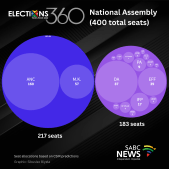For the first time since 1994, the ruling party, the African National Congress (ANC), will not have an outright majority in the National Assembly. With a projected 160 seats (out of 400) in Parliament after the 2024 national and provincial elections, the ANC looks set to lose 70 of the seats they received after the 2019 elections (230 seats).
This means that the ruling party will have to form a coalition with one or more parties in order to reach a majority in parliament.
What are the possibilities?
We speculate on some scenarios based on the CSIR/SABC prediction model.
What if the ANC goes into a coalition with the Democratic Alliance (DA)?

With the DA adding their 87 seats, this coalition would control 247 seats in parliament, well over the 200 seats threshold needed to reach a majority, but this does not give the coalition a 2/3 majority (266 seats) needed to change the constitution.
What if the ANC goes into a coalition with the uMkhonto Wesizwe (MK) party?

It is possible for the ANC to go into a coalition with the newly formed (but ANC breakaway party), uMkhonto Wesizwe which controls 57 seats.
It would form a coalition with 217 seats in the national assembly, which forms an outright majority in the 400-seat parliament, but even united, this will not be enough for a 2/3 majority.
What if the ANC forms a coalition with the EFF and the IFP?

The ANC’s 160 seats need just 40 seats to form an outright majority in the national assembly (400 seats). The Economic Freedom Fighters (EFF) controls 39 seats, just one seat short of making a ANC+EFF coalition complete.
But, if the ANC added the Inkatha Freedom Party (IFP) and its 17 seats to the coalition, this would allow the ANC+EFF+IFP coalition to control 216 seats in the 400-seat national assembly.

